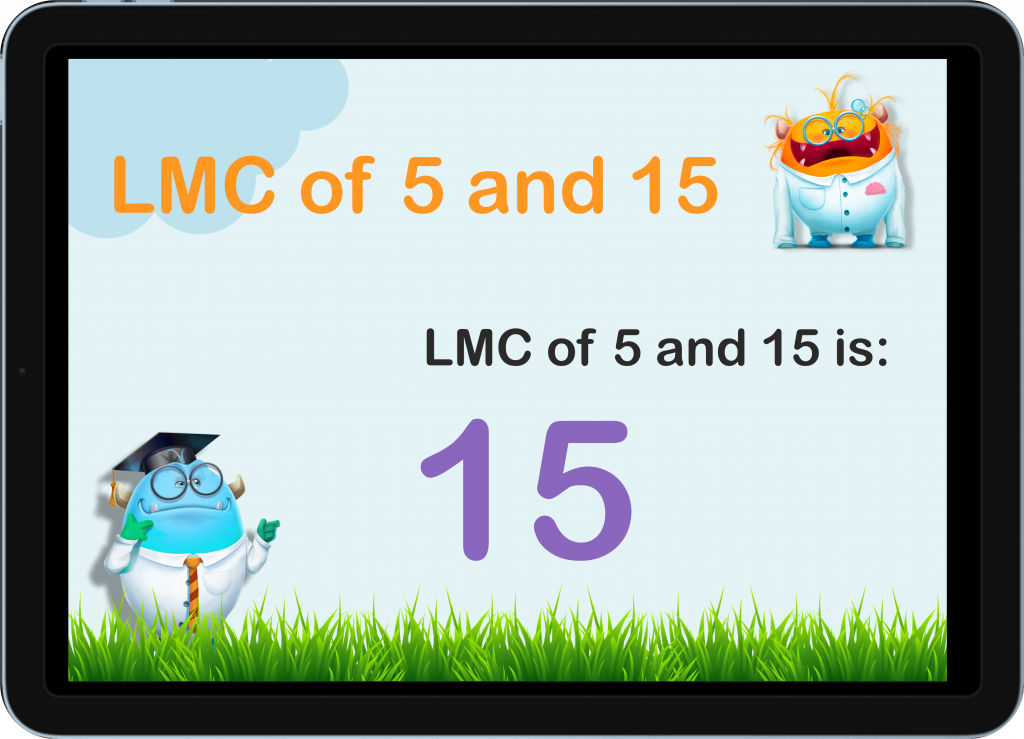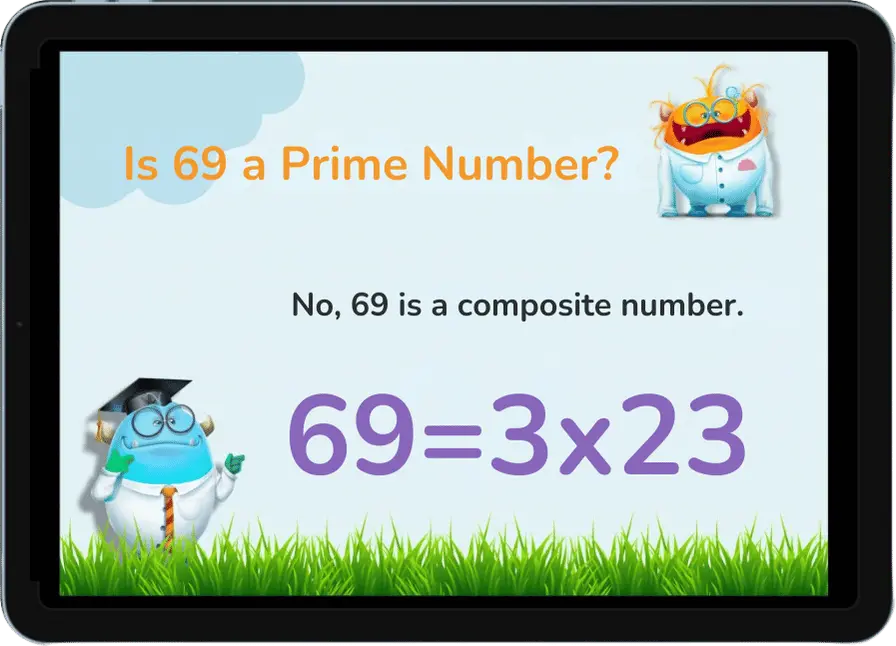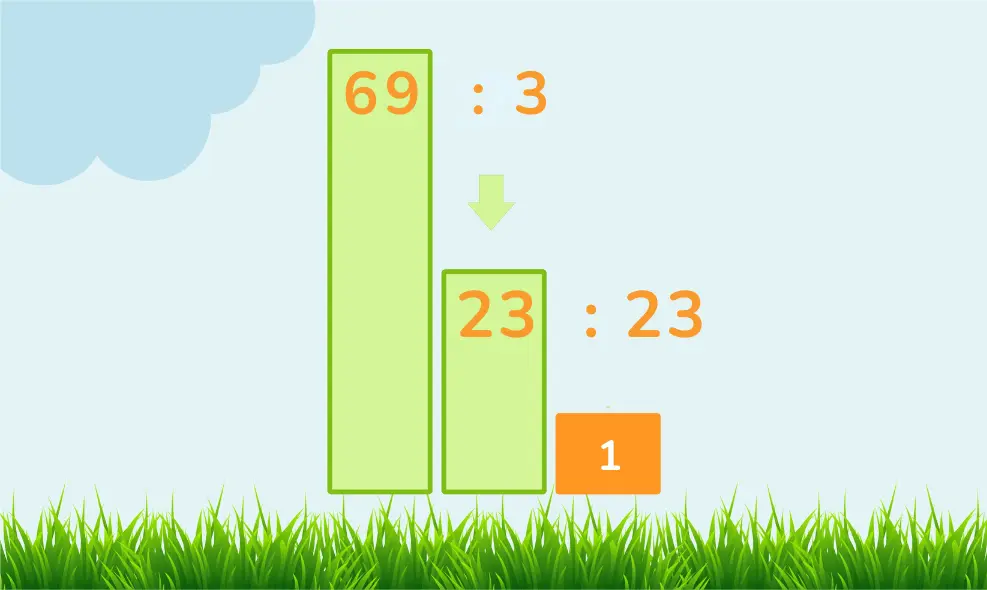Is 2 A Prime Number?
Prime vs. Composite Numbers
Greetings, young math enthusiasts! Today, let’s set sail on a mathematical voyage to determine if 2 is a prime number, and learn more about the difference between prime and composite numbers.

Is 69 a Prime Number?
Or is 69 a Composite Number?
Curious about why number 69 isn’t a prime number? Buckle up. We’re about to dive into the fascinating world of 69. But first, let’s lay down some groundwork to understand what makes a number prime or composite.


No credit card required

No credit card required
What Are Prime and Composite Numbers?
Is 69 a Prime Number?
Why is 69 Not a Prime Number?
What are the Prime Factors of 69?
What are the Factors of 69?
Does 69 Have 2 Factors?
Is 69 a Perfect Square?
What Type of Number is 69?
Fun Facts About 69
Is 69 a Semiprime Number?
What Are Prime and Composite Numbers?
First things first, let’s understand what prime and composite numbers are. A prime number is a number that has exactly two distinct factors: 1 and itself.
This means that it can only be divided evenly by 1 and the number itself. Some examples of prime numbers are 2, 3, 5, 7, and 11.
On the other hand, a composite number has more than two factors. This means it can be divided evenly by numbers other than just 1 and itself. Examples of composite numbers are 4, 6, 8, 9, and 12.
Is 69 a Prime Number?
Now that we know what prime and composite numbers are, let’s figure out if 69 is a prime number. To do this, we need to check if 69 has any factors other than 1 and itself.
Why is 69 Not a Prime Number?
To determine if 69 is a prime number, we can try dividing it by numbers other than 1 and 69. Let’s start with 2. Since 69 is an odd number, it cannot be divided evenly by 2. Next, let’s try dividing by 3. When we divide 69 by 3, we get 23. This means that 3 and 23 are factors of 69. Because 69 has factors other than 1 and itself, it is not a prime number. Instead, it is a composite number.
What Are Prime Factors of 69?

Prime factors are the prime numbers that, when multiplied together, give the original number. To find the prime factors of 69, we need to break it down into its prime components.
We already know that 69 can be divided by 3 to give 23. Since both 3 and 23 are prime numbers, the prime factors of 69 are 3 and 23.
What Are Factors of 69?
Factors of a number are the numbers that can be multiplied together to get the original number. The factors of 69 are 1, 3, 23, and 69. This means that if you multiply 1 by 69, or 3 by 23, you will get 69.
Does 69 Have 2 Factors?
We already know that a prime number has exactly two factors: 1 and itself. Since 69 is not a prime number, it has more than two factors. As we mentioned earlier, the factors of 69 are 1, 3, 23, and 69.
Is 69 a Perfect Square?
A perfect square is a number that can be expressed as the product of an integer multiplied by itself.
For example, 4 is a perfect square because it can be written as 2 × 2, and 9 is a perfect square because it can be written as 3 × 3. To check if 69 is a perfect square, we need to see if there is an integer that, when multiplied by itself, equals 69. After checking, we find that there is no integer that meets this condition. Therefore, 69 is not a perfect square.
What Type of Number is 69?
Now that we know 69 is not a prime number or a perfect square, let’s see what other types of numbers it belongs to. Here are a few categories:
- Odd Number: 69 is an odd number because it is not divisible by 2.
- Composite Number: As we’ve discussed, 69 is a composite number because it has more than two factors.
- Semiprime Number: A semiprime number is a composite number that is the product of exactly two prime numbers. Since 69 = 3 × 23, it is a semiprime number.
- Natural Number: 69 is a natural number because it is a positive integer.
- Whole Number: 69 is a whole number because it is a non-negative integer.
Fun Facts About 69
Let’s wrap up with some fun facts about the number 69:
- In Roman numerals, 69 is written as LXIX.
- 69 is the atomic number of thulium, which is a rare earth element.
- In music, the song “Summer of ’69” by Bryan Adams is a popular hit.
- The number 69 has a symmetrical appearance, making it look the same when flipped upside down.
Is 69 a Semiprime Number?
Yes, 69 is a semiprime number because it is the product of exactly two prime numbers, 3 and 23. This makes it a special type of composite number with a unique property.
Conclusion
So, we’ve learned that 69 is not a prime number but a composite number with four factors: 1, 3, 23, and 69. It is also a semiprime number because it is the product of two prime numbers.
While 69 is not a perfect square, it is an interesting number with various mathematical properties and fun facts. Understanding numbers like 69 helps us appreciate the fascinating world of mathematics!
Learn More About Prime Numbers
© 2024 Smartick. All Rights Reserved.
